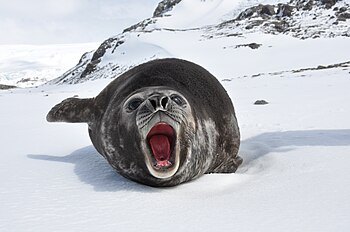Talk:Southern elephant seal
| This article is rated B-class on Wikipedia's content assessment scale. It is of interest to the following WikiProjects: | ||||||||||||||||||||||||||||
| ||||||||||||||||||||||||||||
Early comments
[edit]Eating SHARKS????!!!! Any documentation?65.223.141.108 19:58, 4 Feb 2005 (UTC)
I didn't write this article, but I have been (within 10 feet) of the seals on several occaisions. I believe they only eat small sharks, but they are a HUGE animal. The other elephant seal article says the biggest one ever was 22 feet long and 7500 pounds. -Exsequor.
- It's not impossible. They dive extremely deep, and in deeper water smaller sharks are relatively common. Sides, plenty of things eat sharks. I once saw a picture of a Caspian Tern with a baby horned shark. Sabine's Sunbird 21:27, 28 July 2005 (UTC)
some major rewriting needed
[edit]Much of this article was clearly written by someone whose first language was not English. While the meaning is fairly clear, the text should be rewritten. I'll get around to it, but anyone is welcome to make the changes.Bob98133 (talk) 22:32, 18 February 2008 (UTC)
—Preceding unsigned comment added by Kisalli (talk • contribs) 17:52, 16 February 2009 (UTC)
Yes I took this info from the French article translated into English. Bobisbob (talk) 18:32, 21 February 2008 (UTC) I think that all these 'Bobs' around are the same person just writing for the sake of writing something. Oh, and I also do not believe that it eats sharks or octopuses, or any of that kind of thing. I have read in a couple of other websites taht it's diet contains squid and fish. So, on, I do not agree with that, but otherwise, well done whoever wrote this article. Very pleased with the good job you did, Even though I Would'''' like some more interesting stuff on the habitat. —Preceding unsigned comment added by 122.109.61.188 (talk) 07:32, 7 November 2008 (UTC)
French article text.
[edit]I am planning on bringing back the text from the French article. I know it has grammar problem but can't that be taken care of? Bobisbob2 (talk) 19:01, 19 October 2008 (UTC)
I went ahead and put it back but I took out some sections and corrected grammar and wording. It may need more work though so I left a grammar tag. Bobisbob2 (talk) 22:27, 19 October 2008 (UTC)
It is far from the biggest carnivore. Killer Whale and Sperm Whale are much bigger.
- The article was talking about land-based carnivores in the order Carnivora. Sperm Whales and Orcas belong to the order Cetacea. 123.208.153.238 (talk) —Preceding undated comment added 02:36, 31 August 2009 (UTC).
File:Mirounga leonina.jpg to appear as POTD soon
[edit]Hello! This is a note to let the editors of this article know that File:Mirounga leonina.jpg will be appearing as picture of the day on August 15, 2011. You can view and edit the POTD blurb at Template:POTD/2011-08-15. If this article needs any attention or maintenance, it would be preferable if that could be done before its appearance on the Main Page so Wikipedia doesn't look bad. :) Thanks! howcheng {chat} 18:16, 13 August 2011 (UTC)
Comments
[edit]The article on the Southern Elephant Seal is very complete, with details ranging from Social Behavior and Reproduction to Conservation, and even a section about Minazo. I also liked how there were many images and captions associated with nearly every section of the article, drawing the reader in and clearing illustrating certain points in the text. The article goes into detail about the reproduction behaviors of southern elephant seals, describing the combat that takes place between males to control their harems; there is also a picture of two fighting seals. All aspects of the southern elephant seal are covered in great detail, in very factual and neutral writing style with many footnotes and references throughout the article, though the writing does not flow very smoothly. Although the Minazo section has some citations, several more are needed. I also do not think that Minazo may be significant enough to be included on this article; someone passionate about the cause may have added this, thus hurting neutrality. A possible section to add would be the southern elephant seal’s interaction with other animals (including humans). Njoymusic2 (talk) 19:47, 25 September 2012 (UTC)
The first paragraph says something is 40% lighter, then says something else is 2.5 times lighter. I think the usage should be consistent? - Signed, anonymous guy who doesn't know how to use wikipedia — Preceding unsigned comment added by 2402:8200:171B:FD00:691F:E09B:C3C1:22C9 (talk) 10:45, 31 August 2016 (UTC)
2nd Lead image
[edit]I'm not sure the 2nd lead image was an adult female southern elephant seal. Could you find one? — Preceding Esagurton (talk) 11:23, 3 February 2018 (UTC)
What's a nursery?
[edit]The article says: "Young weaned seals gather in nurseries until they lose their birth coats."
That is obviously relevant information, but for someone like me who isn't familiar with seals it seems to be missing a few words. Is an elephant-seal nursery a geographic location, or a behaviour pattern, or both, or what? TooManyFingers (talk) 13:57, 26 June 2020 (UTC)
Wikipedia Ambassador Program course assignment
[edit]![]() This article is the subject of an educational assignment at Washington University supported by the Wikipedia Ambassador Program during the 2012 Fall term. Further details are available on the course page.
This article is the subject of an educational assignment at Washington University supported by the Wikipedia Ambassador Program during the 2012 Fall term. Further details are available on the course page.
The above message was substituted from {{WAP assignment}} by PrimeBOT (talk) on 16:24, 2 January 2023 (UTC)


